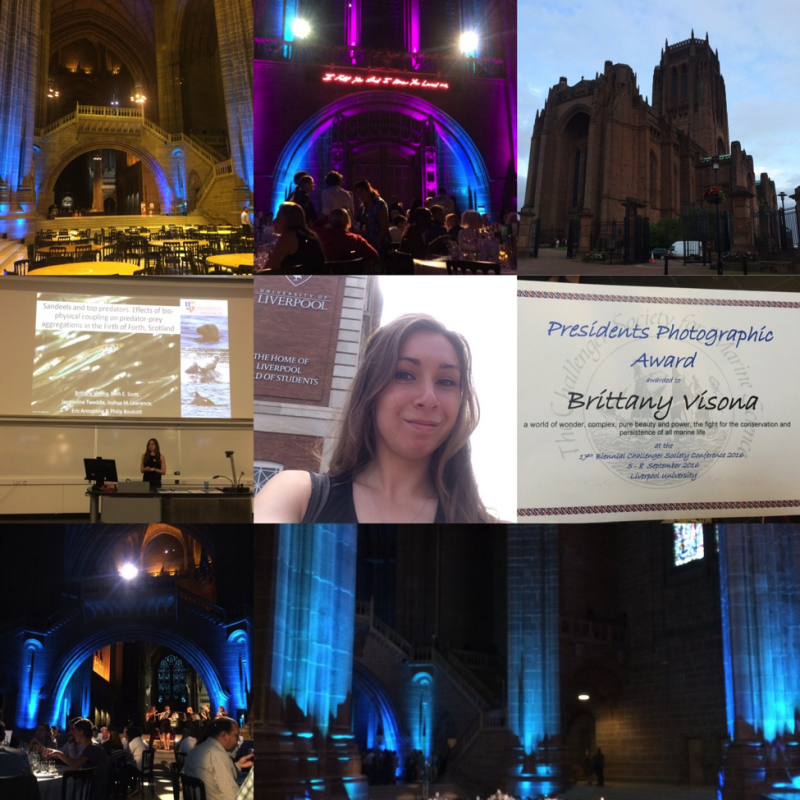Biennial Challenger Conference: Liverpool
Brittany Visona
University of Aberdeen

Image Caption: Summary of my experience at the 2016 Biennial Challenger Conference including presenting my research, dinner at the Anglican Cathedral, and winning the Presidents Photographic Award.
Thanks to the Challenger Travel Grant I was able to attend the Challenger Society’s Biennial Conference in Liverpool, where I presented my masters research on the bio-physical factors effecting the spatial overlap of predators and prey. Being a Canadian international student studying in Scotland over the last year, this was my first opportunity to explore parts of England where I have never been, and attend my first scientific conference.
During my time in Scotland the most I had heard of Liverpool was of its famous football teams. Little did I know that Liverpool itself has much more to offer with gorgeous waterfronts, museums, roman-like architecture, heritage sites, and is the home to the Beatles and the Titanic. Being the European Capital of Culture, the city was filled with an immense amount of history. Luckily for us at the Challenger Conference, we were able to enjoy one of its many historical venues. The conference dinner was held in the Anglican Cathedral which is the largest cathedral in Britain, holding the largest organ and the world’s highest and heaviest bells. All of us at the conference were taken back by the vast size and complex architecture of the cathedral, which held as the perfect venue for a couple glasses of wine, a delicious meal including Liverpool cake, and hours of intellectual conservations.
The conference itself was held at the University of Liverpool, where approximately 400 delegates of the marine community from around the world attended. A majority of the attendees were based within the UK, however some travelled from Europe, the United States, and even New Zealand to share their research. The four-day conference held a vast array of sessions, ranging from physical oceanography up to biological processes at higher trophic levels. With multiple sessions occurring at the same time, you learned to pre-plan the talks you were most interested in at the beginning of the day and sneak in-between sessions to attend them all. Being more of a biologist than an oceanographer, I walked away from the conference gaining knowledge on everything from renewables and oceanic exchange, to the use of stable isotopes in spatial ecology and the role of society in marine science.
I was luckily enough to be able to present my own research titled, “Sandeels and top predators: Effects of bio-physical coupling on predator-prey aggregations”, during the session, “Drivers for patchiness and marine vertebrate dynamics” This was my first time presenting in front of large scientific audience, and a majority of the researchers I had cited throughout my thesis also presented during this session. This made things a bit intimidating, but was a great opportunity to showcase my work. I was later able to converse with all the speakers from the session over dinner, which provided great networking for future research and publications.
After the four days, I was both mentally and physically exhausted from all the activities and knowledge that were provided, which is a sign of a good conference. I am sincerely grateful to have been able to attend and meet many researchers of the marine scientific community. All in all, it was a superb experience and I was even able to watch a colleague, Shaun Fraser, walk away with the Norman Heaps Prize for Best Early Career Oral Presentation and I myself won the Presidents Photography Prize for my killer whale photo.
Profile:
Miss Brittany Visona is a Masters student from the University of Aberdeen, Scotland. Her research focused on the effects of schooling characteristics of pelagic fish on the distribution and abundance of top predators, and how these schooling behaviours are driven by both biological and physical variables.
Latest News
Royal Society Publishing Photography Competition 2025
Please see a message from the Royal Society below:
We are delighted to announce that the 2025 Competition is now open for entries until 15 August for a chance to win £1000! The competition celebrates the power of photography in conveying the wonder of science happening all around us and photographs can be submitted in the categories of: Astronomy, Behaviour, Earth Science and Climatology, Ecology and Environmental Science, and Microimaging.
The competition is free to enter and open to anyone studying or working in science at graduate level or above. Category winners will receive a one-year membership to the Royal Photographic Society and the overall winner will receive a grand prize of £1,000. Find out more: https://bit.ly/RSPphotocomp
October 2025 MEDIN Workshop: Marine Data Management, Governance and the MEDIN toolset
The Marine Environmental Data and Information Network (MEDIN) are pleased to announce that registration is now open for the next occurrence of our popular free online training workshop: ‘Marine Data Management, Governance and the MEDIN toolset’ on the 13th – 17th October 2025 on OceanTeacher Global Academy.
Marine Data Management, Governance and the MEDIN toolset
The Marine Environmental Data and Information Network (MEDIN) and OceanWise are delighted to invite you to attend our popular free online training workshop: ‘Marine Data Management, Governance and the MEDIN toolset’ on the 19th – 23rd of May 2025.
